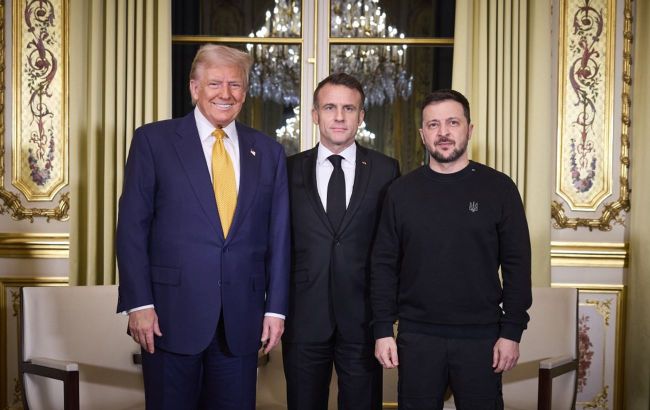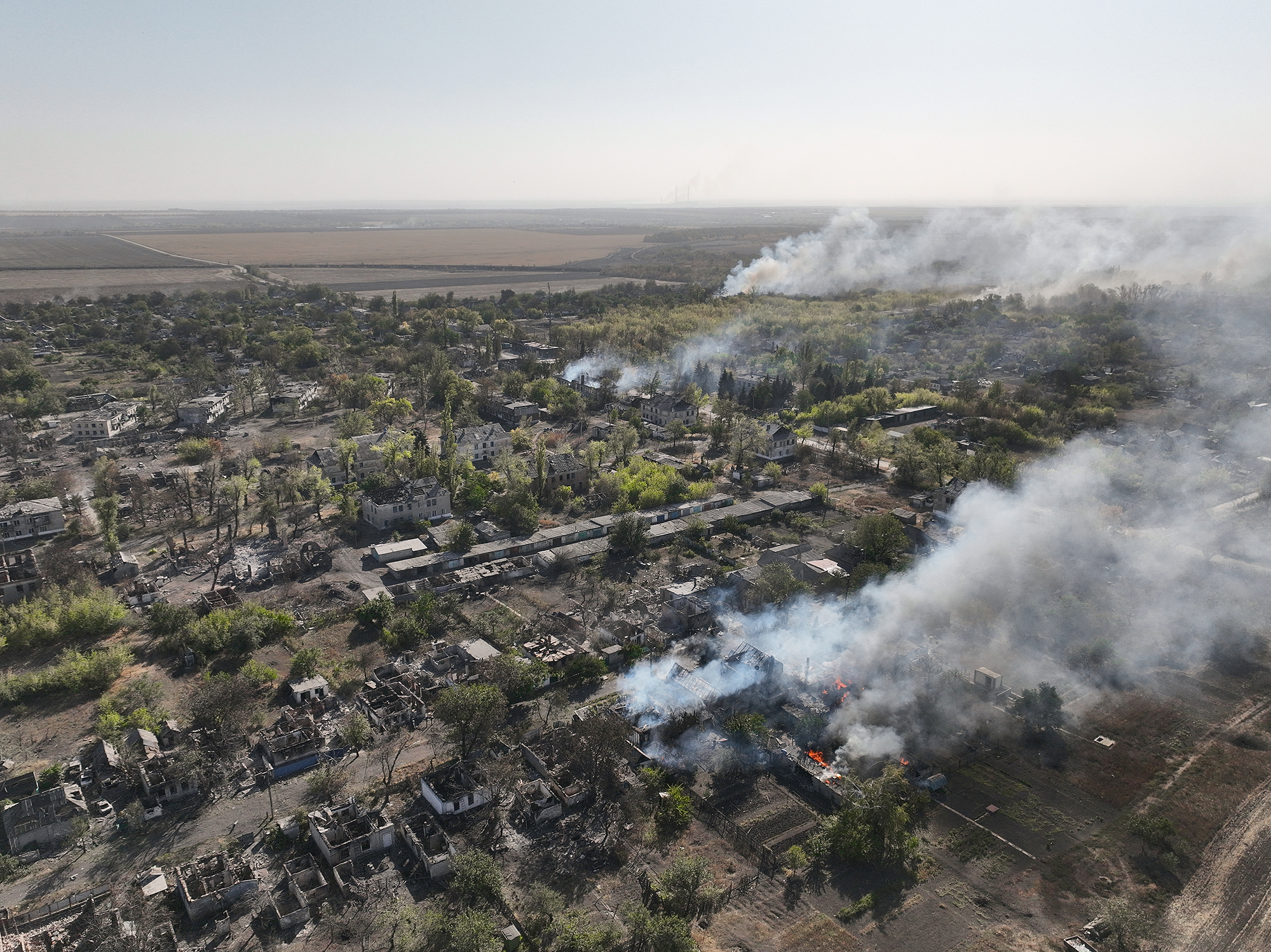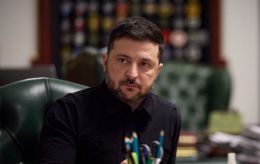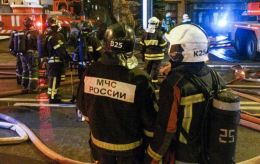Peace or nothing? What Trump's preparing for Ukraine and what's the chance of ending war in 2025
 Donald Trump, Emmanuel Macron and Volodymyr Zelenskyy at a meeting in Paris (photo: president.gov.ua)
Donald Trump, Emmanuel Macron and Volodymyr Zelenskyy at a meeting in Paris (photo: president.gov.ua)
What are the options for a peaceful settlement in 2025, what are the plans of Donald Trump, Europe, and Ukraine, what tasks is the Kremlin setting, and is a ceasefire possible soon - read in RBC-Ukraine's article.
Contents
“We don't know exactly what 2023 will bring us,” President Volodymyr Zelenskyy said in his New Year's address on December 31, 2022. In his address to the new year of 2024, he added: “Whatever the next year brings, we will be stronger.” What exactly Zelenskyy will say tomorrow is, of course, unknown.
But for sure, many Ukrainians would call (or would like to call) 2025 “the year of the end of the war/peace/ceasefire.” First and foremost, of course, this is due to Donald Trump's victory in the presidential election and his widely publicized plans to end the Russian-Ukrainian war as soon as possible.
The daily reports of the world's media about how, when, and under what conditions the war may end also play a role. And although they are mostly based on the words of mysterious anonymous interlocutors in the West, the information background is created accordingly. Indeed, many find it hard not to believe that we are dealing with a self-fulfilling prophecy.
But despite the thousands and thousands of different insights, statements, and comments that have been made in recent weeks, the parameters of a peaceful settlement remain almost completely in the dark.
Positions of Trump and Russia
“What we want, they don't want. Nobody wants what Trump wants,” a prominent member of Zelenskyy's team told RBC-Ukraine.
Trump himself has already publicly admitted that ending the war in 24 hours has turned out to be a much more difficult task than he initially thought. Therefore, according to numerous reports, the future US president has focused on the tactical goal of achieving a ceasefire.
For his audience (which is who Trump thinks about first and foremost), this may well be considered the war's end. People in Eastern Europe have stopped killing each other - is that not a success? It's easy to imagine Trump himself boasting from the stage in his usual manner, stretching his words and holding his arms out to the side: “While Biden was in office, the war lasted three years. When I came in, the war ended immediately. Under Biden, millions of people died, under me, no one dies.” And then, in all likelihood, Trump would gladly hand over all negotiations on the border, guarantees, peacekeepers, and other modalities to Europeans, Ukrainians, and Russians, and plunge headlong into domestic American affairs.
But even Trump will not have a magic wand to silence the guns after his inauguration. The Ukrainian government does not want an unconditional ceasefire for obvious reasons.
 Volodymyr Zelenskyy and Donald Trump at a meeting in New York (Photo: Getty Images)
Volodymyr Zelenskyy and Donald Trump at a meeting in New York (Photo: Getty Images)
First, RBC-Ukraine's interlocutors say, it is necessary to receive firm, realistic security guarantees in any form: peacekeepers, long-term commitments to supply weapons, etc.
In addition, trust in the aggressor country has naturally been, is, and will be at zero. And the Russians can violate the ceasefire at any time. One of the representatives of the Ukrainian President's team described the following scenario: the ceasefire is lifted, martial law is lifted, and Ukraine goes to the polls, but a week before the vote, the Russians (of course, blaming Kyiv for everything) resume hostilities. And what do you do then? Do you still hold elections? And what if there are no physical conditions for this? Cancel the elections? But this will be strongly opposed by many inside Ukraine, especially those who hoped to get a good result in the elections. As a result, we will end up with chaos, which is exactly what Russia needs. “In addition, there is talk that if there is a ceasefire, the borders will be opened, everyone will leave, and the Russians will attack again, but there is no one to mobilize, etc.” the source says.
Russia is not willing to agree to a ceasefire yet either, as Russian Foreign Minister Sergei Lavrov publicly stated last week. And in general, the Kremlin is not ready for serious negotiations for a simple reason: it sees no point in them if it has the initiative on the frontline. The task of the occupiers is clear: to reach the administrative borders of Donetsk and Luhansk regions, as well as to oust the Ukrainian Armed Forces from the Kursk region.
In addition, as informed sources told RBC-Ukraine, Moscow's military wing - various generals led by Gerasimov - has significantly strengthened its position, pushing aside the conventional businessmen who were still involved in the decision-making process a few years ago and are relatively negotiable. Meanwhile, the “shoulder straps” are pushing Putin to solve all problems exclusively by military means, showing him various Oreshniks and assuring him that Russia should set itself maximum goals and not compromise.
At the same time, it would be a wise move on the part of the Kremlin not to reject Trump's peaceful ideas a priori, but rather to dance with him, consult with his advisors, and do so with the utmost respect for the future leader of the United States.
RBC-Ukraine has heard the following theory in Ukrainian and foreign circles: we should hope that Russia, like in 2022, as in 2014, will overestimate its own strength and make unforced errors, in tennis terminology. The main one is to show disrespect for Trump.
Perhaps the trial balloon here was a sharp comment by Orthodox oligarch Konstantin Malofeev to the Financial Times. Malofeev said that American peace plans and Trump's special envoy for Ukraine and Russia, Keith Kellogg, should simply be sent to hell. This version is supported by the choice of the speaker himself. Malofeev is certainly close to the Kremlin, but he is not a representative of the official authorities. So it was interesting to see how Trump's team reacted, whether they would swallow this attitude or not. They didn't - Kellogg sharply advised Malofeev on Fox News to know his place.
 Trump's Special Representative for Ukraine and Russia, Keith Kellogg (Photo: Getty Images)
Trump's Special Representative for Ukraine and Russia, Keith Kellogg (Photo: Getty Images)
If contrary to logic, the Kremlin continues to try to act as the hoodlum, and if Trump feels that Moscow treats him with at least a little disrespect, then, according to this theory, the mood of the future president can change very quickly, and Ukraine will get everything and even more from the United States.
Of course, this concept is based on a very shaky foundation - the belief in Trump's complete unpredictability and impulsiveness, his ability to radically revise his decisions.
But in any case, this assistance will be provided not just for free, but under certain conditions, such as lowering the age of mobilization, and optionally, political and economic requirements, such as prompt elections, tax increases, etc. They say that if it is impossible to reach an agreement with Russia, and Ukraine is ready to fight and make further sacrifices, then let's help it.
Another scenario is that if Moscow gets involved in long and fruitless negotiations with Trump's team, it will be a bad scenario for Ukraine because, at that time, the Russians will continue to advance in Donbas and strike at the rear infrastructure.
Trump is actively trying to involve China in solving the problem, even mentioning it in his tweet about his meeting with Zelenskyy and Macron in Paris. “Trump has two options here: either to raise Putin to his level as an equal interlocutor and agree on everything with him or to ask the Chinese to somehow reason with their junior partner,” says a government source.
However, another option is also possible - if Trump sees that he is unable to end the Russian-Ukrainian war, he may simply lose interest in it, shifting everything onto the shoulders of the Europeans, saying that it is your neighbors who are at war, so you deal with them. Naturally, the Europeans do not have a peace plan either.
Europe and Ukraine's stance
European participation in the peace talks so far has revolved around the idea of sending a peacekeeping contingent to Ukraine, and the engine behind this initiative is French President Macron. At the beginning of the year, he already came up with an initiative to send troops to Ukraine. But in Ukraine itself, according to various sources, his idea was either misunderstood or not appreciated, and in the end, nothing came of it. And the French leader did not like it.
Although talks about peacekeepers have been going on for several weeks, there are no specifics as of the end of 2024. And it is in this specificity that the whole initiative makes sense.
First, will these be peacekeepers or instructors who train Ukrainian soldiers? Secondly, where will they be deployed: in the deep rear, on the demarcation line, or somewhere in between? Third, what function will they perform: will they deter Russians from attacking by the mere fact of their presence or will they patrol the entire contact line? Fourth, what kind of mandate will they have to use force and what kind of weapons will they be equipped with? Who will control their activities and who will control those who control them? And so on.
At the same time, RBC-Ukraine's interlocutors estimate the total number of the contingent, if we proceed from its deployment on the demarcation line, at tens of thousands of people, up to 150,000.
Europe is unlikely to do it alone, so Russia may come into play: if the West cannot supply the required number of troops, then Russia may send Kazakhs, the Chinese, or even the North Koreans.
In addition, the disengagement of the parties a priori implies the creation of a demilitarized zone. How deep will it be? And who, Russia or Ukraine, will have to give up a part of the territory under their control? And what if entire cities, such as Pokrovsk or Kostiantynivka, fall into this zone? What should be done with their residents - forcibly evicted? And who will replace them - the same peacekeepers? Or will they turn into ghost towns?
There are no even approximate answers to all these questions. As has often been the case since 2014, the grand concepts of a peaceful settlement are completely shattered by such practical issues on the ground.
 Russian shelling of Pokrovsk (Photo: Getty Images)
Russian shelling of Pokrovsk (Photo: Getty Images)
Nevertheless, Ukraine considers the deployment of peacekeepers as one of the most important potential security guarantees. Unfortunately, Ukraine cannot count on membership or even an invitation to NATO in the foreseeable future. And the authorities are increasingly aware of this.
Of course, the topic of an invitation to join the Alliance will continue to be actively raised in the public sphere, but they are also ready to discuss peacekeepers.
Another point from which Ukraine will not retreat under any circumstances is the non-recognition of Russia's occupation of Crimea, Donbas, and other territories. But here, RBC-Ukraine's interlocutors say, there is support from Trumpists. “Trump's people agree with this because otherwise, it will not be a deal but a kind of surrender,” says one of the sources.
As for the other Ukrainian conditions, which, in particular, were presented by the head of the Office of the President of Ukraine Andrii Yermak during his visit to the United States, there is less understanding. More precisely, there is an understanding, but it is not clear how to implement it. For example, when it comes to the withdrawal of Russian troops from the borders on February 23, 2022. Everyone agrees that the Russians are the occupiers and they must leave Ukrainian land. However, it is unclear how to achieve this. But an immediate ceasefire, unlike the borders of February 23, is seen from across the ocean as quite realistic.
Various RBC-Ukraine interlocutors summarized the following interim result: We need to wait for Keith Kellogg's visit to Kyiv in January, before Trump's inauguration. After that, at least some questions may be answered.

